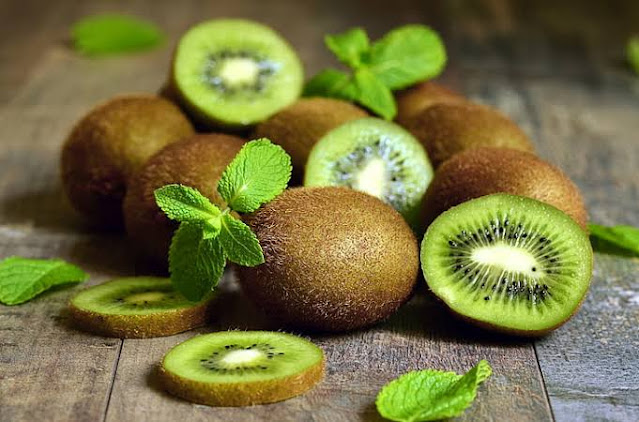Kiwifruit is a small fruit with flavor and health benefits. Their green meat is sweet and delicious. It has also been linked to nutrients such as vitamin C, vitamin K, vitamin E, folate, and potassium. It is also rich in antioxidants and dietary fiber. The grayish-brown peel and small black seeds are edible, but many people prefer to peel the kiwi before eating it. It grows from November to May in California and from June to October in New Zealand. Kiwi fruit can also be found in supplement form.
Nutrition :
Contain In 140g kiwi Fruit :
- Energy : 90
- Fiber : 5g
- Carbs : 21g
- Fat : 1g
- Sugar : 15g
Vitamin & Minerals :
- Vitamin C
- Folate
- Vitamin E
- Vitamin K
- Vitamin A
- Calcium
- Magnesium
- Phosphorus
- Potassium
- Copper
- Iron
Helps Treat Asthma :
The high levels of vitamin C and antioxidants in kiwi fruit are actually known to help treat asthmatics. A 2000 study found that people who ate fresh fruit like kiwi had a positive effect on lung function. Fresh fruits such as kiwifruit can cause wheezing in sensitive babies.
Kiwi fruit is rich in fiber and very useful for digestion. It also contains a proteolytic enzyme called actinidine, which helps break down proteins. A recent study found that kiwi fruit extract containing actinidin significantly improves digestion of most proteins.
Strengthens The Immune System :
Kiwifruit is rich in nutrients and contains vitamin C. In fact, one cup of kiwi provides about 273% of the recommended daily amount. Vitamin C is an essential nutrient for strengthening immunity and fighting disease. One study found that kiwi fruit may support immune function and reduce the risk of catching a cold or flu. This is especially true of risk groups such as adults and children over 65 years of age.
Reduces The Risk Of Other Health Problems :
Oxidative stress can damage DNA and cause health problems. Thanks to antioxidants, some evidence from previous studies suggests that regular consumption of kiwi fruit or kiwi fruit extract is associated with a risk of oxidative stress, as oxidative DNA damage has been linked to colon cancer.
Helps Control Blood Pressure :
Kiwi fruit not only strengthens the immune system, but also helps control blood pressure. A 2014 study found that three kiwi fruit bioactive compounds per day could lower blood pressure by more than one apple per day. In the long run, it also means a lower risk of developing conditions that can cause high blood pressure, such as a stroke or heart attack.
Reduces Blood Clotting :
Kiwi fruit not only helps control blood pressure, but also reduces blood clotting. A study from the University of Oslo found that eating two to three kiwis per day significantly reduced the risk of blood clots. It has also been shown to reduce the amount of fat in the blood. The researchers said these effects were similar to the effects of a daily aspirin dose on improving heart health. Preventing Vision Loss: Macular degeneration is a leading cause of vision loss, and kiwi fruit can protect your eyes. One study found that eating the fruit three times a day reduced macular degeneration by 36%. Kiwi's high levels of zeaxanthin and lutein are thought to play a role.




